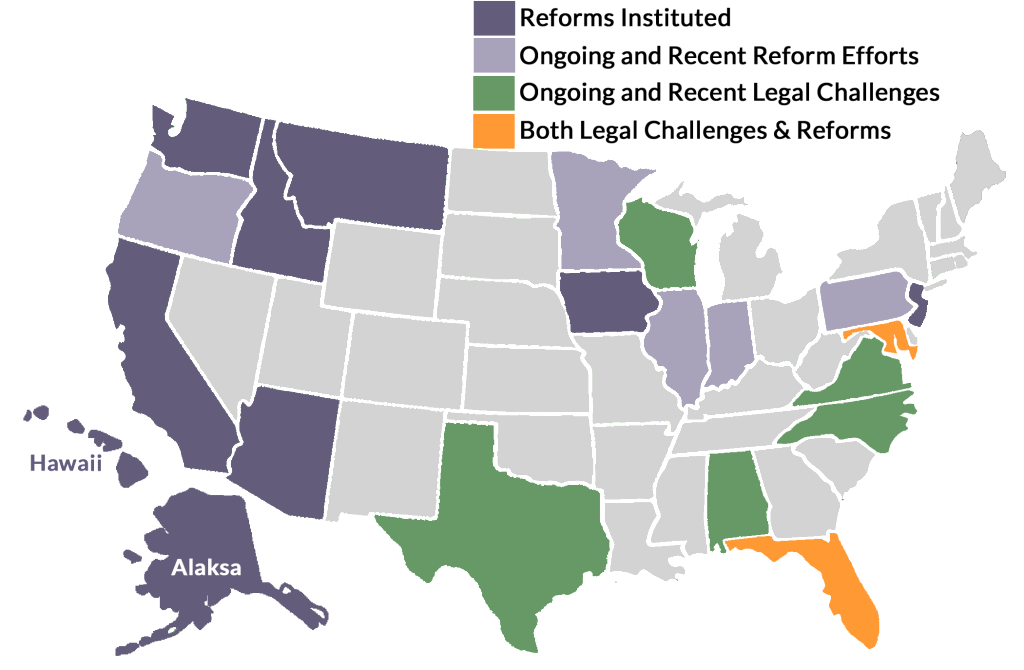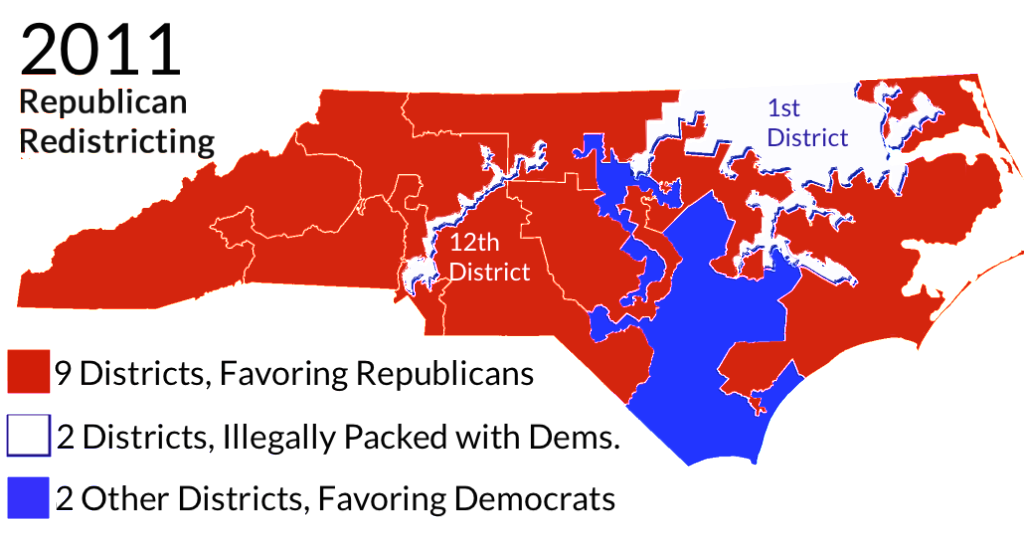Blowback vs ‘Gerrymandering on Steroids’
Washington – In a stunning defeat for what one judge called “gerrymandering on steroids,” a three-judge federal court has ruled that the Republican gerrymandering of North Carolina’s congressional districts in 2011 was unconstitutional on grounds that it was racially driven and illegally packed too many black voters into two districts. The court gave the legislature just two weeks to fix the problem.
This decision is a striking echo of the rising call for political reforms from presidential candidates and popular movements across the country. It has already emboldened North Carolina reformers to push for more sweeping reforms. And if upheld, it could have a ripple effect in Virginia, Texas and Alabama where similar lawsuits challenge so-called racial gerrymandering by Republican-led legislatures.
Cynics will argue that partisan manipulation of political district lines is an age-old, well-entrenched game in American politics. True, but the tide is turning. Gerrymandering is under fire from lawsuits and popular reform movements in 21 of our 50 states.
 Last June, the U.S. Supreme Court demolished the most serious Legal resistance to gerrymander reform by blessing a popular referendum in Arizona that took the mapping of political districts away from the state legislature and turned it over to an independent commission. In July, the Florida Supreme Court threw out that state’s GOP partisan gerrymander and ordered eight congressional districts redrawn. Already, that ruling is reshaping this year’s congressional races.
Last June, the U.S. Supreme Court demolished the most serious Legal resistance to gerrymander reform by blessing a popular referendum in Arizona that took the mapping of political districts away from the state legislature and turned it over to an independent commission. In July, the Florida Supreme Court threw out that state’s GOP partisan gerrymander and ordered eight congressional districts redrawn. Already, that ruling is reshaping this year’s congressional races.
“Mapping Their Way to Victory”
Now comes the North Carolina decision, couched in pointed, politically savvy language from the bench. Joining in the 3-0 decision, District Judge Max Cogburn wrote bluntly: “Elections should be decided through a contest of issues, not skillful mapmaking. Today, modern computer mapping allows for gerrymandering on steroids, as political mapmakers can easily identify individual registrations on a house-by-house basis, mapping their way to victory.”
What Judge Cogburn did not spell out was that before the Republican gerrymander of 2011, North Carolina’s congressional delegation was split 7-6 in favor of Democrats and that after the GOP redrew the maps, the tilt switched 9-4 in favor of Republicans, even though Democratic candidates won the majority of the popular vote for Congress in 2012.
Two districts – The Octopus and The Serpent
 But what the court did state clearly was that in mapping two districts – the First, which spreads like an octopus across northeastern North Carolina, and the Twelfth, which snakes like a serpent along highway I-85 from Greensboro to Charlotte – the legislature violated the “equal protection” clause of the 14th Amendment by establishing “racial quotas” for those two districts packing in too many black voters and diluting black influence in neighboring districts.
But what the court did state clearly was that in mapping two districts – the First, which spreads like an octopus across northeastern North Carolina, and the Twelfth, which snakes like a serpent along highway I-85 from Greensboro to Charlotte – the legislature violated the “equal protection” clause of the 14th Amendment by establishing “racial quotas” for those two districts packing in too many black voters and diluting black influence in neighboring districts.
Writing for the majority, Fourth Circuit Court Appeals Judge Roger Gregory cited evidence that “the legislature assigned race a priority over all other districting factors… and that traditional redistricting principles were subordinated to race.” The First District, he said, is a “textbook example” of racial gerrymandering.
How Gerrymanders Work – Packing
Odd as it may sound, gerrymandering works when the party in control concedes that it cannot carry every district and then cuts its losses – and maximizes its gains – by packing as many opposing voters into as few districts as possible. In North Carolina, the lawsuit accused Republicans of packing too many pro-Democratic black voters into the Octopus and Serpent districts, to make it easier for GOP candidates to win in the surrounding districts.
 The legislature said that it was trying to comply with the 1965 Voting Rights Act that bars racial discrimination in elections and that has caused certain states, mostly in the Deep South, to create districts where black candidates could win seats in Congress. In fact, Democrats actually created the two contested districts with Blacks constituting 42% to 45% of the voters. For two decades, black candidates steadily won elections, aided by crossover voting by whites.
The legislature said that it was trying to comply with the 1965 Voting Rights Act that bars racial discrimination in elections and that has caused certain states, mostly in the Deep South, to create districts where black candidates could win seats in Congress. In fact, Democrats actually created the two contested districts with Blacks constituting 42% to 45% of the voters. For two decades, black candidates steadily won elections, aided by crossover voting by whites.
In 2011, Republicans decided to pack more black voters into those districts by adding black communities from adjacent districts. They contended that the 1965 Voting Rights Act required them to make blacks more than 50% of the eligible voters in each of those two districts.
But the court rejected that argument, saying that the old 42-45% black voter percentage had worked well and agreeing with the plaintiffs’ contention that the legislature had used the Voting Rights Act “as a pretext to pack African-American voters” into the two contested districts “and reduce those voters’ influence in other districts.”
The Shifting Tide of NC Politics
Although legislative leaders vowed to appeal, even stronger gerrymander reform is gaining momentum in North Carolina where activists are calling on the state to follow Arizona and California, which have set up independent redistricting commissions. The court ruling, said Bob Phillips, head of Common Cause in North Carolina, “once again shows the need for North Carolina to establish a non-partisan system for drawing our state’s voting maps.”

Moral Monday movement protests against gerrymandering, for voters; rights. Source (CC): United Workers
Last year, a majority of the North Carolina House co-sponsored House Bill 92, which would shift the job of redistricting from the politicians in the legislature to the nonpartisan legislative staff, a system long used in Iowa. The GOP leadership has tied the bill up in committee. More recently, 240 civic leaders across the state have signed a petition calling for redistricting reform.
And in perhaps the most telltale political shift of all, Republican Governor Pat McCrory, a defendant in the gerrymander lawsuit, has come out against gerrymandering, as has his potential Democratic opponent in the November 2016 elections, state Attorney General Roy Cooper.
 Hedrick Smith, who conceived this website and is its principal writer and architect, is a Pulitzer Prize-winning former New York Times reporter and Emmy award-winning documentary producer for PBS and PBS FRONTLINE.
Hedrick Smith, who conceived this website and is its principal writer and architect, is a Pulitzer Prize-winning former New York Times reporter and Emmy award-winning documentary producer for PBS and PBS FRONTLINE. 



1 Comment